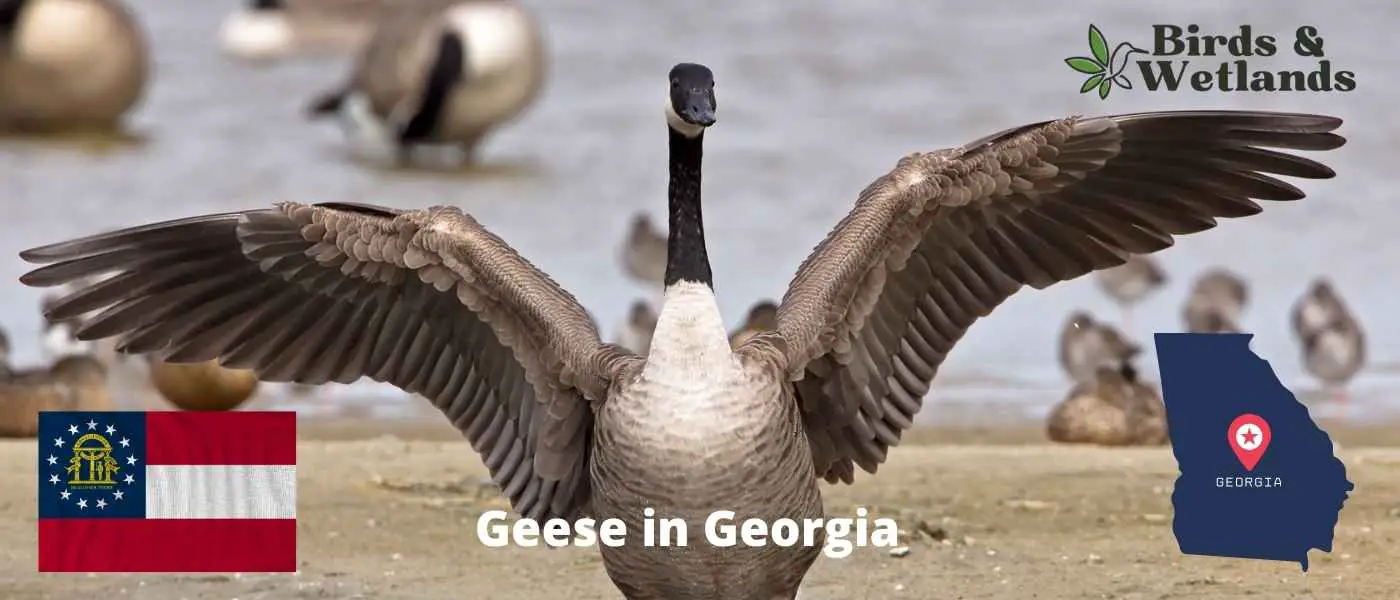In this guide, we will provide a comprehensive guide to American geese in Georgia from identification to behavior. So whether you are a resident of Georgia or just visiting, read on for some interesting facts about these fascinating birds!
What kind of geese are in Georgia?
There are two main species of Geese in Georgia, the Canada Goose and the Snow Goose. The Snow Goose is also further classified as the Lesser Snow Goose and the Greater Snow Goose, but these are essentially the same species. Neighboring states of Tennessee have more types of Geese, and Alabama have a wider range of Geese species, whilst there are less geese species in Florida but they do have the Egyptian goose!
Canada Goose
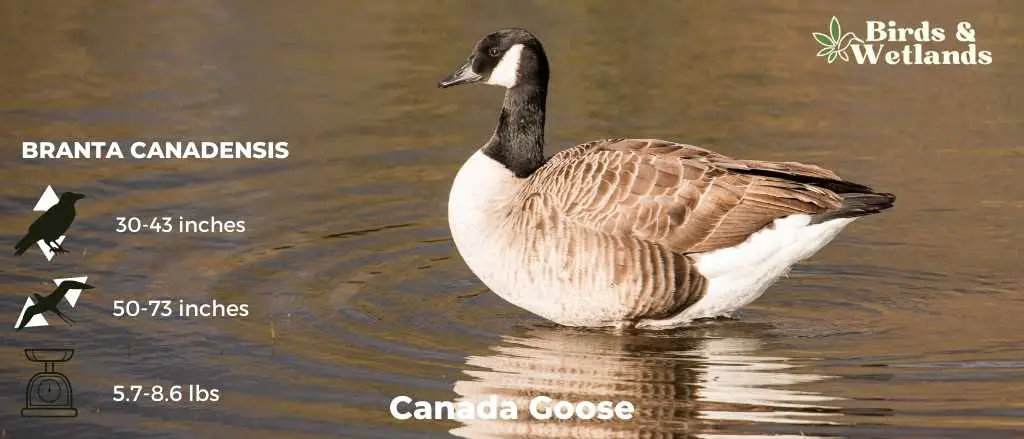
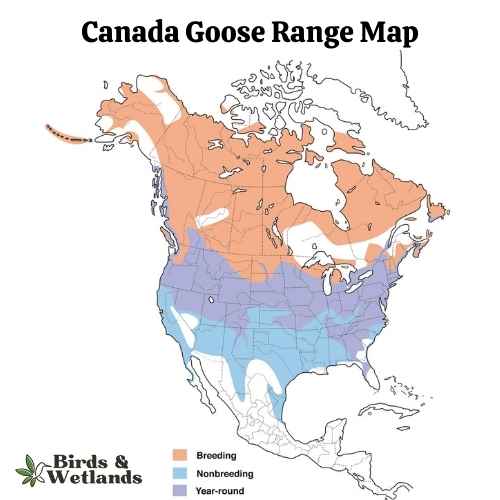
Canada Goose Sound
Scientific Name: Branta canadensis
Length: 30 to 43 in
Wingspan: 50–73 in
Weight: 5.7–14.3 lb
The Canada Goose is a large, well-known species of waterfowl noted for its distinctive appearance, familiar “honk,” and migratory behavior.
Appearance: Both male and female Canada Geese have a similar appearance, featuring a black head and neck with distinctive white patches on the cheeks and chin. The body is primarily brown with a lighter, often white, underbelly.
Diet: Canada Geese primarily feed on plant matter, including grasses, aquatic vegetation, and grains. They can often be seen grazing in parks, lawns, and fields, as well as dabbling in water bodies.
Reproduction: Canada Geese typically nest on the ground near water bodies, often on islands or other isolated areas to avoid predators. The female lays a clutch of about 4 to 6 eggs, which she incubates alone for around a month.
Canada Goose in Georgia
There are resident geese throughout Georgia, and it is estimated the goose population is over 45,000. Whilst Georgia just used to be a migratory route, since the 70’s there are resident geese nesting in Georgia.
The Georgia Department of Natural Resources’ Wildlife Resources Division can help if you have goose problems as a property owner. These are a protected species under state and federal law, however they can send a licensed nuisance wildlife trapper for any adult geese which are causing a nuisance.
Most problems occur in June and July when they lose these flight feathers in the molting season and the flightless geese can’t fly off.
Snow Goose
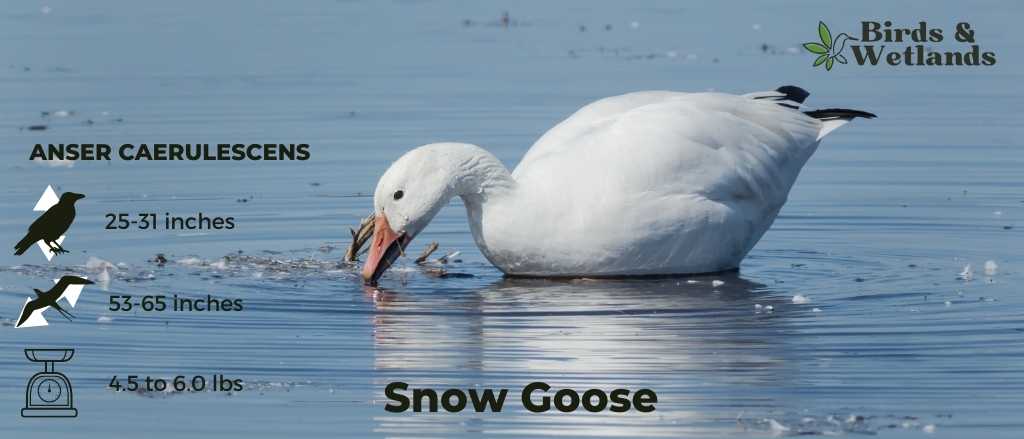
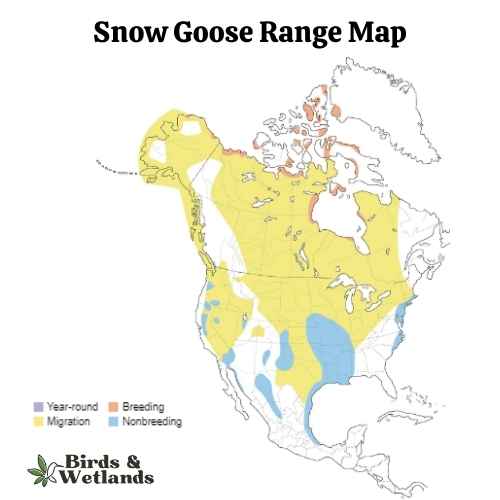
Snow Goose Sound
Scientific Name: Anser caerulescens
Length: 25 to 31 in
Wingspan: 53 to 65 in
Weight: 4.5 to 6.0
The Snow Goose is a large species of waterfowl known for its vibrant white plumage and significant migratory flights.
Appearance: True to their name, Snow Geese are predominantly white with black wingtips. They also have a pink bill, pink legs and feet. A color morph, known as the “Blue Goose,” displays a bluish-gray body with a white head, but is considered the same species.
Diet: Snow Geese primarily feed on plant matter, such as grasses, sedges, and small grains. They can often be seen in large flocks foraging in fields and marshes, and during migration and winter, they can cause considerable damage to agricultural fields due to their feeding habits.
Reproduction: Snow Geese typically nest on the tundra, near water bodies. The female builds the nest and lays a clutch of about 3 to 5 eggs, which she incubates alone for approximately three weeks. Once hatched, the goslings can feed themselves but stay with their parents for protection until they can fly.
Are geese protected in GA?
Yes. It is illegal to hunt, kill, sell, purchase or possess Canada geese except according to Georgia’s migratory bird regulations. The Snow Goose and Canada goose are both protected under state and federal law.
However, you can hunt them under the Migratory Bird Regulations as long as you have a license and permit and a Georgia Migratory Bird Stamp. There are also bag limits, you can see the latest season regulations here.
Can you kill Canadian geese in Georgia?
Canadian geese, also known as Canada geese, are protected by the Migratory Bird Treaty Act in the United States. This means it is illegal to harm, capture, kill, sell, or keep these birds without a proper permit. However, in certain situations where geese are causing significant property damage or posing a risk to human health or safety, the U.S. Fish and Wildlife Service may issue permits to control, and in some cases, euthanize the birds. Each state, including Georgia, may have specific regulations as well, so it’s essential to check local laws and guidelines.
Tips for Dealing with Nuisance Geese
There are several ways to deal with geese in suburban neighborhood ponds, gold courses or local property. Try harassment techniques like mylar balloons, chemical repellents, string barriers or noise makers.
If these fail, property owners can apply for a permit to have the geese captured and relocated elsewhere.
Bird B Gone Reflect-a-Bird Deterrent
The Ultimate Defense Against Unwanted Birds

Pros
- Highly Effective: Using the power of wind and sunlight, this bird deterrent creates a distraction zone that confuses and scares away pest birds.
- Economical and Humane: This silent bird deterrent is not only cost-effective but also humane, causing no harm to the birds.
- Versatile: Whether you’re looking to protect buildings, boats, or agricultural settings, this bird deterrent is suitable for a variety of environments.
- Durable: Made from durable aluminum and plastic, this product is designed for outdoor use and can withstand various weather conditions.
- Adjustable Design: With an angled design that can be adjusted up to 90 degrees, this bird deterrent can be installed in various directions, maximizing its effectiveness.
Cons
- Limited Nighttime Effectiveness: The Bird B Gone Reflect-a-Bird Deterrent primarily uses sunlight to create reflective flashes. Consequently, its effectiveness might be limited during nighttime when owls are most active, as it relies heavily on sunlight for operation.

